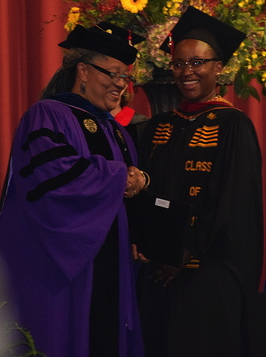Feature: Creating Change Part 4
This week, we continue to share share stories from the students who attended the 26th National Conference on LGBT Equality: Creating Change that was held on January 29 through February 2, 2014. Our final reflection is by VDS alumnua Darria Hudson. (Read the first post here ,second here and third here.)

Lately I’ve been thinking a lot about what Coming Out means, and how that meaning changes depending on where one’s lived experience rests at the intersections of race, class, gender, age, ability, and geography. When I first began to Come To know myself as not straight, I’d gotten the impression that Coming Out was a “big announcement” —a declarative Facebook post or a heartfelt letter, or a courageous step up to a microphone while the whole world looked on. At first it seemed like something that I should do, a rite of passage into the LGBTQIA2 family, but I also felt hesitant, unsure. It was over a year after I Came To that I received much-needed wisdom for my personal journey— that Coming Out is not an event, it’s a process. Then I began to look closely at the stories of women of color like myself who find their own sexuality under a social media/tabloid high-powered microscope daily: Raven Symone, Janelle Monáe, Michelle Rodriguez, Queen Latifah, and Oprah Winfrey. I’ve watched their steady refusal to be boxed and labeled and have found resonance with their resistance to having their inner lives and personal relationships categorized or politicized. And I began to wonder about the mainstream LGBT coming out narrative—that the more Out and Proud one is, the better it is for us all. That may be true, but what if my self-determination is more complex than that? Conversations with other queer friends of color confirmed that I don’t ask these questions alone, and so when the opportunity came to attend this year’s Creating Change Conference in Houston as part of a team from Vanderbilt Divinity School, I decided to pack my questions and go.
Two moments in particular stand out in my experience: a workshop on coming out in families of color facilitated by Lambda Legal, and an “open-space” session facilitated by members of the Brown Boi Project. In the workshop, I listened to other activists share their experiences of coming out to their families, and we discussed the complicated reasons behind family members’ willingness to accept or reject us, reasons more often than not influenced by systems of oppression and generational survival strategies that can also be death-dealing. Coming Out is not to be taken lightly, and though it is an ultimately liberating and courageous act, it can have grave consequences that should not be trivialized.
In the Brown Boi Open Space I found the most fulfilling engagement of my questions so far. The conversation was centered on locating self-love and self-care in an understanding of our intersecting identities and the interlocking nature of structures of oppression. It is, as Audre Lorde famously pointed out, a revolutionary act to care for oneself when the way that one walks in the world is under constant scrutiny. Coming out then, or being Out or being outed for that matter, are not always chosen situations, but they can be opportunities for exercising our agency in empowering and intentional ways. It was in this space that I was affirmed in my being and doing in the world in all of my identities—African American, Southern, same-gender-loving, female, masculine-of-center, cisgendered, and a person of faith, among others. I was challenged to understand the ways that my intersecting identities are read by those around me, and to be careful with myself as I walk through my own life, knowing that I am ultimately changing the lives of others.